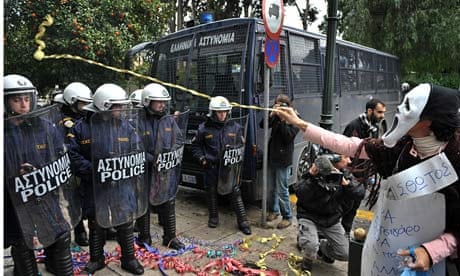They called it a "river of fury". And the seemingly endless flow of Greeks who marched in protest today over the government's painful fiscal policies were motivated by a single force: rage.
Anger in Athens starts with graffiti and by dawn the calls to battle were daubed across the facades of banks and shops and government buildings. By noon it had morphed into a "resistance movement" as militant leftwingers and striking civil servants – some holding banners, some pounding drums, some shouting themselves hoarse – took to the streets to denounce measures seen as the only way to extract Greece from its worst economic crisis in decades.
"We are at war with the government because it is clearly at war with us," snapped the former communist MP Dimos Koumbounis. "The working class will respond with ever greater force and intensity to overturn these unjust and antisocial policies."
Under unprecedented pressure from markets and his EU colleagues, the socialist prime minister George Papandreou said he had no other choice but to implement the "painful but necessary" policies last week. The measures include public sector pay freezes, the raising of the retirement age, slashing of bonuses on salaries and tax rises across the board. For the newly-elected socialists, forced to roll back many of their campaign promises, these measures are imperative if Greece is to rein in its €300bn (£270bn) public debt. Papandreou has pledged to trim the deficit from 12.7% to within the EU's permissible 3% limit by 2012.
But if there was any doubt that the government would face resistance it was put to rest today . Again and again, as the protesters chanted "we are not Ireland, we will resist", the nationwide strike was painted as the beginning of a backlash against the "tsunami of attacks on workers".
"There should be no sacrifice for the plutocracy," said Vasiillis Stamoulis, one union leader as he took to the podium erected in front of Athens' sandstone parliament. "Those who are responsible should pay for the crisis: the bankers, industrialists, ship-owners, big merchants, the oligarchy of this country."
Stamoulis was not alone. As they marched through Athens arm-in-arm ignoring the rain, Greeks young and old said the crisis was not of their making. The Greek state may have been profligate but that was because it had suffered at the hands of politicians who had "eaten" from the trough of almost every official coffer.
"It's not our fault that our country's public finances are in such a mess," said Spyros Papadopoulos, a hospital worker. "It's the fault of capitalists like the bankers, who got bailed out by the [previous] conservative government to the tune of €28m and the Greek shipping community that never pays a cent in tax. Why is it always the lower-income strata who have to pay the price," he asked as the "river of fury" snaked its way around one of Athens' giant squares. "What they are trying to do is roll back our hard-earned rights, rights like the eight-hour day and a decent pension after a lifetime's work. This is a crisis that is going to make the poor even poorer and the rich even richer. It's totally unfair."
Walking ahead under a giant umbrella, her collar held to her chin, Angela Drossou, a translator, wholeheartedly agreed. It was, she said, the first time she had ever come out to demonstrate but circumstances were such that she could do nothing else.
"We are affected every day. It is not only our salary. We live with the anxiety of unemployment," she sighed. "I am 41 and I am very anxious because one day I may wake up and have no job and if I do have a job they may tell me to work four hours a day with a payment that is more like a tip. Profits always rise during austerity periods. All the banks and industry profits rise day by day, hour by hour while we become more and more poor, literally penniless."
Again and again the protesters said, too, that they believed Greece would set an example for others in Europe to follow. "The mobilisation of anti-capitalist forces here has already begun to spill over into other parts of southern Europe and it will spread even more," said Koumbounis. "Our struggle won't die easily."
The prospect of further demonstrations and strikes has raised fears of social unrest in a country that has been racked by street violence for the past 18 months.
This, despite recent polls showing that while Greeks are natural protesters the majority accept that sacrifices have to be made as a necessary evil to redress their country's economic woes.
But Koumbounis rejected suggestions that in the midst of recession his compatriots were prepared to endure yet more belt-tightening.
"Those polls are conducted by capitalists and paid-up journalists serving the government," he said. "They do not represent the true anguish of the Greek people, anguish that is growing by the day."
